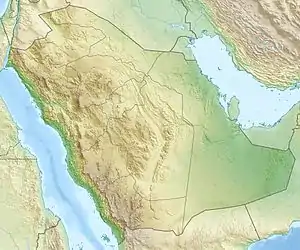Muzdalifah
Muzdalifah (Arabic: مُزْدَلِفَة) is an open, level area near Mecca in the Hejazi region of Saudi Arabia that is associated with the Ḥajj ("Pilgrimage").[1][2][3][4] It lies just southeast of Mina, on the route between Mina and Arafat.
Muzdalifah
مُزْدَلِفَة | |
|---|---|
 Mosque and pebble-collection zone at Muzdalifah | |
 Muzdalifah Location of Mudalifah | |
| Coordinates: | |
| Country | |
| Region | Makkah |
| Government | |
| • Regional Governor | Khalid bin Faisal Al Saud |
| Time zone | UTC+3 (Arabia Standard Time) |
Pilgrimage
The stay at Muzdalifah is preceded by a day at Arafat, consisting of glorifying Allāh (The God) repeating the Duʿāʾ (Supplication), repentance to Allah, and asking Him for forgiveness. At Arafat, Ẓuhr and ʿAṣr prayers are performed in a combined and abbreviated form during the time of Zuhr. After sunset on the ninth day of the Islamic month of Dhūl-Ḥijjah, Muslim pilgrims travel to Muzdalifah, sometimes arriving at night because of over-crowding. After arriving at Muzdalifah, pilgrims pray the Maghrib and ʿIshāʾ prayers jointly, whereas the Isha prayer is shortened to 2 rakats. At Muzdalifah, pilgrims collect pebbles for the Stoning of the Devil (Arabic: رَمِي ٱلْجَمَرَات, romanized: Ramī al-Jamarāt, lit. 'Stoning of the Place of Pebbles').[5][6][7]
The Sacred Monument
| Al-Mash'ar Al-Haram The Sacred Grove | |
|---|---|
ٱلْمَشْعَر الْحَرَام | |
 | |
| Religion | |
| Affiliation | Islam |
| Location | |
| Location | Muzdalifah, Makkah Province, Hejaz, Saudi Arabia |
 Location in present-day Saudi Arabia | |
| Administration | Saudi Arabian government |
| Geographic coordinates | 21°23′10″N 39°54′44″E |
| Architecture | |
| Type | Mosque |
The open-roofed mosque at Muzdalifah is known as "The Sacred Grove"[1][2][3][4] (Arabic: ٱلْمَشْعَر الْحَرَام, romanized: Al-Mashʿar Al-Ḥarām).[8]
See also
References
- Long, David E. (1979). "2: The Rites of the Hajj". The Hajj Today: A Survey of the Contemporary Pilgrimage to Makkah. pp. 11–24. ISBN 0-8739-5382-7.
With thousands of Hajjis, most of them in motor vehicles, rushing headlong for Muzdalifah, the potential is t ... There is special grace for praying at the roofless mosque in Muzdalifah called al-Mash'ar al-Haram (the Sacred Grove) ...
- Danarto (1989). A Javanese pilgrim in Mecca. p. 27. ISBN 0-8674-6939-0.
It was still dark when we arrived at Muzdalifah, four miles away. The Koran instructs us to spend the night at al-Mash'ar al-Haram. the Sacred Grove at Muzdalifah, as one of the conditions for the hajj . We scrambled out of the bus and looked ...
- Jones, Lindsay (2005). Encyclopedia of religion. 10. Macmillan Reference USA. p. 7159. ISBN 0-0286-5743-8.
The Qur'an admonishes: "When you hurry from Arafat, remember God at the Sacred Grove (al-mash' ar al-haram)," that is, at Muzdalifah (2:198). Today a mosque marks the place in Muzdalifah where pilgrims gather to perform the special saldt ...
- Ziauddin Sardar; M. A. Zaki Badawi (1978). Hajj Studies. King Abdul Aziz University. Jeddah: Croom Helm for Hajj Research Centre. p. 32. ISBN 0-8566-4681-4.
Muzdalifah is an open plain sheltered by parched hills with sparse growth of thorn bushes. The pilgrims spend a night under the open sky of the roofless Mosque, the Sacred Grove, Al Mush'ar al-Haram. On the morning of the tenth, all depart ...
- Burton, Richard Francis (1857). Personal Narrative of a Pilgrimage to El Medinah and Meccah. p. 226.
The word jamrah is applied to the place of stoning, as well as to the stones.
- Abū Dāʼūd (1984). Sunan Abu Dawud: Chapters 519-1337. Sh. M. Ashraf.
1204. Jamrah originally means a pebble. It is applied to the heap of stones or a pillar.
- Hughes, Thomas Patrick (1995) [1885]. Dictionary of Islam. p. 225. ISBN 978-81-206-0672-2.
Literally "gravel, or small pebbles." The three pillars [...] placed against a rough wall of stones [...]
- Quran 2:129 (Translated by Yusuf Ali)
